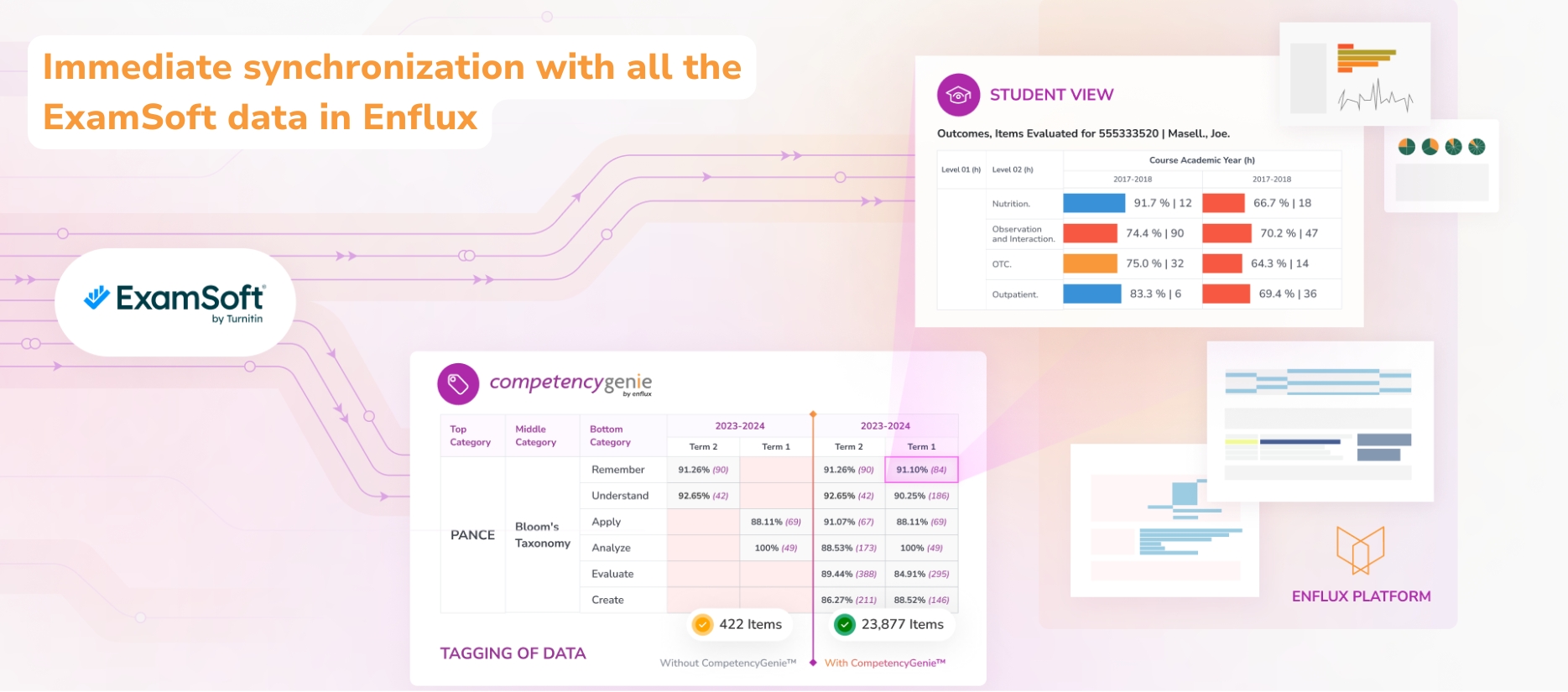
Data-Driven Strategies for Meeting Pharmacy Program Accreditation Standards
As pharmacy education evolves to meet the demands of a dynamic healthcare environment, institutions are under increasing pressure to demonstrate curricular alignment, transparency, and accountability. The Accreditation Council for Pharmacy Education (ACPE) sets the benchmark through rigorous pharmacy accreditation standards, guiding programs toward continuous quality improvement (CQI) and competency-based education.
To meet these expectations, institutions must move beyond static reporting and manual processes. Leveraging technology—such as AI-driven exam tagging, centralized analytics, and real-time dashboards—has become essential for aligning with accreditation standards for pharmacy education.
This article outlines the challenges facing programs today and provides actionable strategies for leveraging technology to meet and exceed ACPE accreditation standards for pharmacy.
Understanding ACPE accreditation standards for pharmacy education
The ACPE 2025 standards establish a framework for evaluating the quality and effectiveness of Doctor of Pharmacy (PharmD) programs. Accreditation confirms that a program meets established pharmacy program accreditation standards through a combination of self-study, peer review, and formal site visits.
Unlike licensure, which applies to individuals, accreditation standards for pharmacy schools focus on institutional practices and systems. Key areas of emphasis in the ACPE 2025 dashboard include:
- Alignment of Course Learning Objectives (CLOs) and Program Learning Outcomes (PLOs)
- Integration of Interprofessional Education (IPE)
- Competency-based curriculum development
- Curriculum mapping and assessment cohesion
- Continuous use of data for CQI and strategic decisions
- Evidence of student progression, learning, and achievement
Compliance with these standards ensures institutional credibility while fostering long-term educational effectiveness.
Overcoming common challenges in pharmacy accreditation
Despite the benefits of accreditation, schools of pharmacy frequently encounter operational challenges, including:
- Complex and time-consuming documentation for accreditation reviews
- Inconsistent or incomplete exam item tagging
- Lack of access to real-time, actionable data for CQI and program evaluation
- Disconnect between curriculum maps and assessment outcomes
- Limited faculty capacity to manage manual reporting tasks
These challenges impact not only compliance but also a program’s ability to drive innovation, ensure student readiness, and maintain strategic alignment.
Strengthening accreditation compliance with pharmacy school accreditation software
To address these challenges, forward-thinking institutions are turning to pharmacy school accreditation software to streamline data collection, tagging, and reporting. Enflux supports academic pharmacy programs through a comprehensive platform that includes:
- A centralized accreditation dashboard for pharmacy programs that integrates clinical, didactic, and experiential assessment data from multiple platforms, along with curriculum maps and AACP Program Quality Surveys data
- Role-based visualizations that align assessments and outcomes with ACPE pharmacy accreditation standards
- Real-time student performance analytics by course, outcome, or cohort
- Evidence-based reporting for internal reviews and pharmacy program accreditation site visits
- A built-in ActionPlan Management System that helps track continuous quality improvement (CQI) initiatives, assign responsibilities, set timelines, and document progress toward accreditation goals
With tools tailored to meet the needs of Accreditation Council for Pharmacy Education (ACPE) schools, Enflux helps reduce administrative burden, promote institutional effectiveness, and ensure greater transparency and accountability throughout the accreditation process.

“I was amazed to see a task that used to take one of our staff members two weeks to complete is now being accomplished in just 4 hours with Enflux!”
Ashley Castleberry, Pharm.D., M.Ed
Assistant Dean for Curriculum and Assessment Division Head and Clinical Associate Professor of Pharmacy Practice | The University of Texas at Austin College of Pharmacy
Streamline ACPE-aligned exam tagging and curriculum mapping with CompetencyGenie™

One of the most resource-intensive aspects of accreditation is exam tagging. CompetencyGenie™, Enflux’s AI-powered solution for ExamSoft users, helps programs overcome this challenge by enabling fast, accurate, and scalable bulk tagging of assessment items across multiple educational frameworks:
- ACPE Standards 2025 and national competency models
- NAPLEX Competency Statements and 2025 blueprint
- AACP COEPA and JCPP Pharmacist Patient Care Process
- ACCP Pharmacotherapy Toolkit
- Bloom’s Taxonomy (cognitive levels)
- Interprofessional Education (IPE) domains
- Exam item type, instructional themes, and author metadata
By automating this process, CompetencyGenie™ reduces faculty workload and improves the consistency of pharmacy program reporting for accreditation, positioning institutions for long-term success.
Strategic recommendations for aligning with pharmacy program accreditation standards
To effectively meet accreditation requirements and build sustainable practices, pharmacy education leaders should consider the following evidence-based strategies:
1. Implement an accreditation dashboard
Adopt pharmacy school accreditation software that integrates AACP survey data, curriculum maps, assessment results, and accreditation evidence into a unified, real-time platform. This promotes transparency and facilitates data-informed decision-making.
2. Standardize assessment tagging with CompetencyGenie™
Use AI-powered bulk tagging to apply consistent competency mappings across all assessment items—including historical data. This enhances tagging accuracy, reduces faculty workload, and improves the quality and reliability of accreditation reporting.
3. Reframe Continuous Quality Improvement (CQI) as a strategic asset
Leverage real-time, visualized data to support faculty development, identify students in need of intervention, and inform curriculum enhancements. This positions CQI not just as a compliance requirement but as a driver of program quality and student outcomes.
4. Integrate accreditation into the institutional data ecosystem
Embed accreditation planning and reporting within broader institutional analytics processes. A continuous, collaborative approach ensures alignment with institutional goals and promotes sustained readiness for accreditation review.
Future-ready accreditation: Leveraging technology in pharmacy education
As the landscape of pharmacy education evolves, institutions must align accreditation practices with emerging technologies and shifting regulatory expectations. Tools such as accreditation dashboards, AI-assisted assessment tagging, and integrated analytics systems provide pharmacy programs with the capacity to meet ACPE accreditation standards efficiently and with greater precision.
By adopting platforms like Enflux, institutions can transition from reactive compliance to proactive planning—supporting a sustainable model for continuous improvement, curricular coherence, and student success.
Strengthen your strategy for ACPE 2025 compliance
Join the Enflux Assessment Academy
Leverage data-driven tools to simplify accreditation reporting and curriculum alignment.
